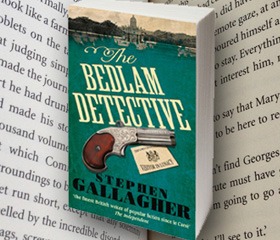Books
The Hardest Chapter: The Bedlam Detective by Stephen Gallagher
We caught up with Stephen Gallagher, screen-writer and novelist to ask him which was the hardest chapter to write in his chilling, gothic thriller The Bedlam Detective.
His answer provides a fascinating insight into writing for different mediums.
Here’s what he had to say:
“The Bedlam Detective wasn’t a hard book to write. Just hard to get written.
If you know my stuff at all you’ll be aware that I’ve led a double life, writing for the page and for the screen. I learned something important very early on – that the two skills are related, but they’re not the same. I’ll get back to this.
When the idea for the book came, it came all in one; Sir Owain Lancaster, Edwardian engineer and armaments manufacturer, is one of only two survivors of a self-funded Amazonian expedition which saw his entire party wiped out, wife and child included. Once a rational man, his explanation for the tragedy is a nightmarish fantasy of lost-world monsters and mythical beasts. The other survivor tells a different story. The tale is given impetus in the here-and-now by the need to solve a series of cruel murders on Sir Owain’s estate.
I already had my protagonist lined-up and ready to go. Sebastian Becker first appeared in The Kingdom of Bones, where he was a British-born Pinkerton man obsessed by a case from his past. The end of that novel saw him arriving back in Southampton in 1911 with his American-born wife, her sister, and teenage son. There was an early draft of Kingdom in which Becker didn’t survive the final pages, but the instincts of my agent Howard Morhaim set me straight on that one.
At that point I had no specific plans for the character. But while researching something unrelated I came across the biography of Sir James Crichton Browne, the Lord Chancellor’s Visitor in Lunacy, and saw a small space in history just waiting to be filled. Sebastian Becker became Crichton Browne’s Special Investigator, his go-to guy in mysteries involving criminal insanity, and I was away.
A serviceable story idea is never just one thing. It’s at least two notions working together, sparking each other off, their interaction creating unexpected developments. If one of your notions involves a situation and the other a character, be grateful. That’s storytelling gold. The narrative grew, its themes began to emerge, characters and incidents and locales began to grow around each other. I reached the point where the whole thing was thought through and imagined and ready to be set down.
Then the phone rang.
To cut a complicated story short, within a few weeks I’d relocated to Los Angeles and was tied up full-time in what would be the first of a number of US network TV jobs. I had an office on the Warner Bros lot, my name on a parking space, and production responsibilities unknown to a writer in British television. I had a canyon home where the only sounds at night were the howling of coyotes and the occasional crashing of Charlie Sheen’s Mercedes through the backyard. What I didn’t have was any easy opportunity to put The Bedlam Detective into its final form.
I have a pretty well-developed writing method. With the secure foundation of a workable idea I can break a thing up into stages, with a fair sense of how long each will need. I can then block out time on a calendar and set my own deadlines. But here’s where the difference between scripting and prose writing comes in; on my blog I once wrote:
The prose writer and the screenwriter live in two universes that move at very different speeds. The screenwriter who doesn’t get it will turn out books that read like novelisations. The novelist will write a script that can’t be shot.
I do both but I cannot, with ease, switch gears between the two. And I was now living out in Beverly Glen, with London locations to be visited as part of the final research pass. These included the Maritime College at Greenwich; the site of Cecil Hepworth’s silent film studio at Walton-on-Thames (of which only the power house remains, now an amateur playhouse): the Bethlehem Hospital building and its Lambeth grounds, now home to the Imperial War Museum; and the Northumberland mansion that was the model for Sir Owain’s Victorian home. I’m a great believer in visiting your locations. Even when little of anything remains; you’ll always find something to which you can fasten your imagination.
A production hiatus over the Christmas period gave me the opportunity to get home and gather that final tranche of material. A show cancellation, never welcome in itself, provided the necessary block of weeks for the final push. I set the daily target and off I went.
No chapter, I’d say, was harder to write than any other, but I can tell you which was the easiest. Titled Extract from The Empire of Beasts by Sir Owain Lancaster, FRS, it’s an episode from the man’s own account of his misfortunes, a sustained delusion of Victorian heroism that gave me the opportunity to channel the styles of Conan Doyle, Rider Haggard, and all those other writers of Gaslight fiction from the turn of the last century. When compared with the emerging truths of later accounts, it can be interpreted as a complex act of psychological survival; but while Lancaster has the stage to present his version of events, it was an opportunity to shoot for pure high adventure in the grand tradition.
Why was it easy? Because I just had to pull the plug, and a lifetime of joy came out. From dusty old magazines to scratchy black and white monster movies, from Wells and Verne to Classics Illustrated, from The Strand to All-Story Magazine… it was like a visit to my own personal lost world, my earliest discoveries of what fiction could do.
I have, in all honesty, been taken aback by its reception.”
Learn more about creative writing from Author Wiley Cash’s Hardest Chapter.
Further reading:


Please note: Moderation is enabled and may delay your comment being posted. There is no need to resubmit your comment. By posting a comment you are agreeing to the website Terms of Use.